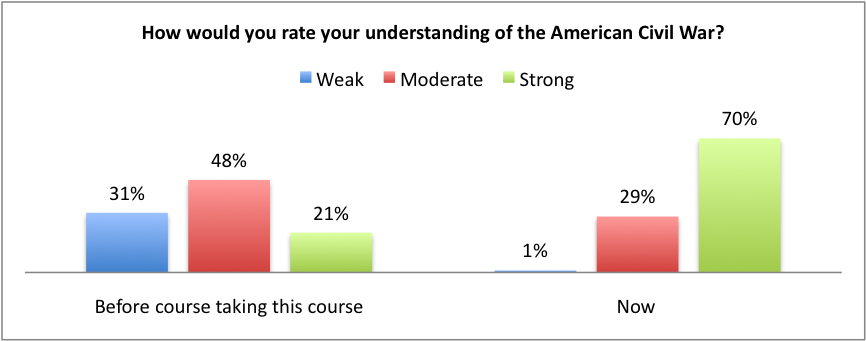Evaluating Columbia's Civil War and Reconstruction MOOC
Evaluation is a key component of all of the University’s online initiatives, including its venture into massive open online courses (MOOCs), a new and potentially disruptive mode of distance learning. Unlike traditional online courses, which are aimed at select audience (e.g., tuition-paying students), MOOCs are open to the world and generally free of charge. The only prerequisites are a computer, an Internet connection, and some self-motivation. Fees are minimal because MOOCs don’t confer college credits, and there is little or no teacher-student interaction. Yet the courses are not inexpensive to develop—it can easily cost tens of thousands of dollars to plan, film, edit, build and run a MOOC.
For now, benefits to the institution are largely indirect. MOOCs can help elite universities fulfill a social mission to disseminate knowledge more widely and reach people without access to higher education. The Office of the Provost points to other advantages in a recent report:
“MOOCs provide faculty with opportunities to think deeply about pedagogy and generate much-needed attention to the University’s core teaching mission. They generate unprecedented data about student learning experiences that instructors can use to improve teaching. They attract huge numbers of students, contribute to Columbia’s reputation as a global university and may attract students to traditional Columbia programs.”
In the Fall of 2014, Columbia launched its first humanities MOOC, a three-course series on the Civil War and Reconstruction (CWR), taught by Dewitt Clinton Professor of History Eric Foner. In consultation with CCNMTL, Foner opted to host the CWR series on edX, a non-profit platform established by MIT and Harvard. His objective is to make his lectures forever free to the public and available to other teachers to draw from.
Foner’s passion for the subject and for teaching comes through clearly in the CWR lectures, which CCNMTL taped live in the classroom and then segmented into short clips for the online platform. The authentic classroom setting is one aspect that sets CWR apart from other MOOCs (many of which are taped in a studio). There are other innovative features, such as high-resolution images of primary documents and artifacts, and online discussions moderated by Foner’s team of graduate TAs. CCNMTL has worked with Foner and his teaching staff, and with University archivists, to make the online course as engaging as the online environment allows.
What has been the reaction to innovations in the CWR series? CCNMTL has been assessing the user experience by conducting mid-course and exit surveys, and by collecting user data from the edX platform. (See an earlier article on CWR lessons here.)
In February 2015, CCNMTL conducted an exit survey of students enrolled in the second part of the CWR series. Among the most exciting findings: participants who consider themselves to have a “strong” understanding of the Civil War was 70% at the end of the course, compared to 21% before taking the course. Those who feel they have a “weak” understanding of the period fell from 31% to 1%.

In the surveys, many participants comment on the impact the course is having on their lives. Here is one such tribute:
“I'm a high school student from Australia and this is definitely the best history class I've ever taken in my life. Professor Foner’s teaching style is one of the key aspects that made this course so interesting. In my high school English class, we are reading ‘To Kill a Mockingbird’ by Harper Lee and this course significantly increased my understanding of the historical context of the novel. Thanks to this course, my English teacher now refers to me as the ‘encyclopedia of American Civil War history’. I love this amazing course very much and thank you all for bringing it to the world!”
View the full CWR Part 2 exit survey.
Continuous evaluation has allowed CCNMTL to make real-time adjustments to the ongoing CWR series. More importantly, the Center will use the feedback to help guide the structure of future MOOCs, as well as other online and hybrid learning initiatives.
---
Editor's Note: Laura Moustekarski is a freelance writer and editor. She has been working closely with the CCNMTL CWR team throughout the development and production of Professor Foner's courses.


